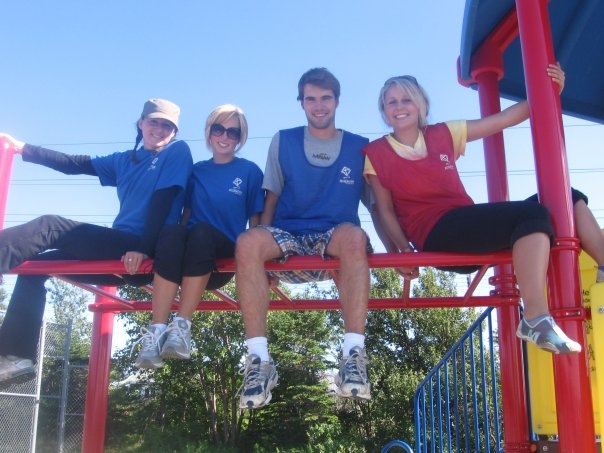My name is Laura, I’m 24 years old, and I am allergic to fish and shellfish!
I have worked for 5 years at many different summer camps for kids aged 5 to 12 years old, and I have some stories and tips for campers and staff with food allergies who want to participate in summer camp!
For 5 years, I worked for a local summer camp program. I started off as a general counsellor, and worked my way up to supervisor throughout the years! I was able to learn how allergies are managed, both on site and in the main office, when kids register for camp!
I was also fortunate enough to work at a camp with The Newfoundland and Labrador Lung Association, called “Camp Breathe Away,” which was a camp specifically for children with asthma and allergies! This weekend-long overnight camp was special. A doctor came with us, in case there were any emergencies. The camp was extra vigilant in ensuring that there were NO allergens on site for any of the campers and that all campers had their puffers and epinephrine auto-injectors on hand, with a back up kept with the counselors! The camp had 15 kids and 5 counselors, and all of the allergies on site included peanut, fish, shellfish, egg, milk, and bees! The weekend was a lot of fun, it and ran without any problems! For many campers, this was their first opportunity for an overnight camp experience. We were very fortunate to have a doctor on site with us – and it helped to ease the minds of parents!
Not all summer camps are that vigilant or specialized when it comes to allergy and asthma management, but that doesn’t mean that you can’t go to camp if you have allergies or asthma! It is manageable, but will take some behind-the-scenes work by you, your parents, and the camp program managers and counselors before attending!
For Campers with Allergies:
When your mom or dad registers you for any camp, they should alert the program of your allergy! At our camp, this flagged staff to keep an eye out for kids with allergies. Camp is manageable with allergies; just make sure that everybody knows about it!
Things to remember:
- Tell your on-site counselors and the manager of the program about your allergy, to make sure that they are aware on site.
- Give the counselors an Anaphylaxis Emergency Plan, with a recent picture of yourself!
- Make sure that the counselors who are with you all day are trained on how to use an EpiPen® or Twinject®, whichever you carry!
- Make sure that you keep your epinephrine on you at all times, and don’t forget to bring it on field trips or other excursions! Be sure to check when your devices expire!!
- If you’re not sure that the food provided by the camp is safe, pack your own lunch, and don’t accept food from other campers! Our camp had a “no sharing” policy, and all the staff and children were alerted of allergies on site – but you can never be too safe, so only eat what you bring and know is safe!
- Ask the counselors to post signs or send out newsletters to let other campers and their parents know that a camper has allergies. If the camp restrict certain allergens, it should also share that information.
- Tell a counselor immediately if you feel like you are having an allergic reaction!
For Counselors with Allergies:
I was a counselor with an allergy, and my fear was often helping kids with their meals when I did not know what they brought or how it was prepared! But that is not an issue if you keep yourself safe by proper hand washing. You should also alert your coworkers, the campers, and their parents that there is an allergy on site, so they can avoid bringing unsafe foods.
Things to remember:
- The same guidelines as the “For Campers” can be followed for counselors!
- Make sure that your coworkers know how to use an EpiPen® or Twinject®. This helps not only you, but also campers with allergies!
For All Staff:
- Be sure to alert yourself of the kids on site with allergies, and know where they keep their epinephrine.
- Learn the proper use and administration of an EpiPen® and Twinject®, and who to call for emergency services
- If possible, don’t bring allergens to camp, and be aware of cross-contamination issues.
- Don’t bring or offer any foods to the campers, unless you have okayed it with your supervisors and the parents of children with and without allergies! This can vary, based on the summer camp and its policies.
For more information on how to manage allergies at summer camp, contact your local summer camp programs, and find out how they handle allergies! You might find that some programs are better or worse than others! Pick the one that best suits you! Where I worked, kids went home for lunch, and parents found this to be a helpful way to manage allergies at mealtime, since snacks were the only foods eaten at camp! Do your research before attending camp, and you will be well on your way to a super fun and safe summer camp experience!
Enjoy the sunshine, and enjoy summer camp, even with allergies!! J
~ Laura
For more reading, check out Hannah’s post, “Camp will be an experience that I will never forget”
Tags: Camp / Camping, Holidays, Laura B., Travel
